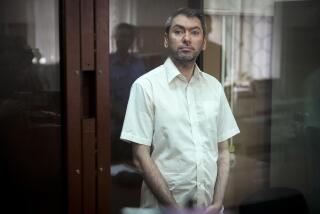Sakharov: Now a Symbol of Change : Gorbachev Runs Risks in Nudging Soviets Toward ‘Reform’
- Share via
The return of Andrei Sakharov and his wife Yelena Bonner to Moscow and the end of their exile in Gorky is good news--not only for the Sakharovs but also for what it may portend about an improvement in Soviet human-rights policies.
We should not overdo it. The Soviet Union is not on the verge of becoming another Canada or Sweden. But at the same time we should give credit where it is due. Let us applaud the Soviet Union and its leader, Mikhail S. Gorbachev, for doing the right thing--for personally calling Sakharov and allowing him to return to his research--and hope that this is the first in what may well become a series of more humane actions.
While it is certainly too soon to proclaim the dawn of a new, more humane, Soviet Union, there is no doubt that something profound is happening inside the country. Gorbachev has even gone so far to call for “democratization.” What he means by that is not exactly clear, but it seems linked to his concern about the need for a radical transformation of the country’s economy. He seems to recognize that you cannot stimulate innovation, foster high technology and provide for a better standard of living without lifting some of the political and social restraints that have constrained the Soviet people for so long. Gorbachev has come to realize that it is not only his countrymen’s political behavior that is affected but their creativity as well.
This explains in large part why he has come to call for glasnost , or more openness, why he has called upon Soviet writers to mobilize the country’s energies, why he authorized an attack in Pravda on the late Leonid I. Brezhnev for his ineptness and economic incompetence, and why he has even hinted at the need for a mild form of pluralism.
Gorbachev’s call for a conference on human rights in Moscow in 1987, the prospect of a “law on the procedure for protesting to the courts for relief from illegal actions by officials in violation of citizens’ rights” and the passage of a new immigration law effective Jan. 1 all fit in with this pattern. So do his calls for a less defensive response to those who pressure for human rights and for a resumption of the dialogue with leaders of the American Jewish community.
Undoubtedly some of this is being done more for international appearances than for actual improvement. Gorbachev has begun to invite foreign businessmen to start joint ventures inside the country. This is much easier to do when the Soviet Union is seen to be liberalizing, rather than intensifying, its controls.
However, while some of the more publicized dissidents and refuseniks such as Anatoly Shcharansky have been released, the total number of refuseniks allowed out of the country in 1986 will probably be under 1,000, which is a throwback to the 1960s.
In addition, the new immigration law is seen by some as a much tighter measure since it limits those who can leave the country to blood relatives seeking family reunification, not cousins and other more-distant relatives.
Yet lest we become too cynical about Gorbachev’s motives, it is necessary to realize that his human-rights initiatives and what appears to be liberalization are not without cost. First of all, he has stirred up the conservatives. Gorbachev himself acknowledges that he faces fierce opposition. For example, in a June 19 speech to the Soviet Writers Congress, Gorbachev is reported to have warned that the opponents of change broke Nikita Khrushchev’s neck and are trying to do the same to him if necessary, going so far as to resort to terror.
The conservatives fear all change; they especially fear liberalization. Undoubtedly some of them will characterize last week’s riots in Alma Ata, the capital of Kazakhstan, as the inevitable consequence of a more relaxed policy.
In a society that has insisted on strict political controls for 70 years, any relaxation is like opening Pandora’s Box. As Deng Xiaoping continues to find in China, the calls for democratic reform sometimes have a way of generating their own momentum and going beyond what even the liberals in the party may think wise.
That is Gorbachev’s dilemma. He must have liberalization if he is to carry out his reforms. This will bring him support within and out of the Soviet Union. At the same time, Gorbachev runs the risk that he may unduly arouse expectations that he cannot satisfy.
If those who are disappointed link up with those who feel he has gone too far, Gorbachev may find--just as Khrushchev did in 1964--that the role of the reformer in the Soviet Union is risky.
More to Read
Sign up for Essential California
The most important California stories and recommendations in your inbox every morning.
You may occasionally receive promotional content from the Los Angeles Times.













